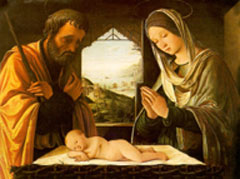Jesus’ parents were Mary and Joseph. Mary was a virgin who miraculously conceived Jesus through the Holy Spirit.
Joseph was a carpenter who took on the role of Jesus’ earthly father. They played essential roles in raising and nurturing Jesus throughout his life. The birth of Jesus is a significant event in Christianity and is widely celebrated as Christmas.
According to the Bible, Mary was visited by the angel Gabriel, who informed her that she would give birth to the Son of God. Joseph initially planned to divorce Mary quietly when he discovered she was pregnant, but an angel appeared to him in a dream, assuring him that the child was conceived by the Holy Spirit. Together, Mary and Joseph embraced their divine calling and provided love, guidance, and support to Jesus as he grew into his role as the Savior of humanity.
The Virgin Birth Of Jesus
The Virgin Birth of Jesus is a biblical belief that states Jesus was born to the Virgin Mary. According to Christian tradition, Joseph, Mary’s husband, was not involved in Jesus’ conception.
The birth of Jesus Christ is a key aspect of Christian theology, with the belief that he was conceived miraculously in the womb of the Virgin Mary. This event, known as the Virgin Birth, holds profound significance in Christianity. Let’s explore the biblical accounts of the Virgin Mary’s role, the significance of her virginity in Christianity, and the concept of a miraculous conception.
Biblical Accounts Of The Virgin Mary’S Role:
- The Gospel of Matthew (1: 18-25) narrates that after being betrothed to Joseph, Mary becomes pregnant through the Holy Spirit. An angel appears to Joseph in a dream, assuring him of the divine origin of Mary’s pregnancy and directing him to proceed with the marriage.
- The Gospel of Luke (1: 26-38) describes the Annunciation, in which the angel Gabriel appears to Mary, proclaiming that she will conceive a child by the Holy Spirit. Mary, despite her initial confusion, humbly accepts this miraculous message, declaring herself as the Lord’s servant.
The Significance Of Mary’S Virginity In Christianity:
- Mary’s virginity is considered a vital aspect of Jesus’ divine nature and his identification as the Son of God. It underlines the belief that Jesus was not conceived through human means but by the intervention of the Divine.
- In Christian theology, Mary’s virginity highlights her purity and holiness, making her a suitable vessel for the Incarnation. It emphasizes her unique role as the Mother of God, who bore and nurtured the Savior of humanity.
- The perpetual virginity of Mary is a doctrine upheld in various Christian traditions, asserting that she remained a virgin before, during, and after the birth of Jesus. This belief signifies the sanctity and reverence shown towards Mary within Christianity.
Exploring The Concept Of A Miraculous Conception:
- The concept of a miraculous conception challenges conventional notions of human reproduction. It highlights an extraordinary event where a child is conceived without natural biological processes.
- The Virgin Birth represents a divine intervention that affirms Jesus’ unique nature as both fully human and fully God. This miraculous conception sets him apart from all other figures in history.
- The belief in the Virgin Birth has theological implications, expressing the belief in Jesus’ sinless nature. By being conceived without the inheritance of original sin, Jesus is seen as the faultless and perfect sacrifice for humanity’s salvation.
The biblical accounts of Mary’s role, the significance of her virginity, and the concept of a miraculous conception all contribute to the profound understanding of the Virgin Birth of Jesus. This foundational belief in Christianity symbolizes the divine nature of Jesus Christ and his essential role in the redemption of humanity.
The Role Of Joseph
Joseph played a key role in the life of Jesus as his earthly father. He and Mary were chosen by God to raise and nurture Jesus, providing him with love, guidance, and support throughout his life. Joseph’s obedience and devotion to God’s plan made him an integral part of Jesus’ journey.
Joseph’s lineage and background:
- Joseph was from the lineage of King David, tracing back to Abraham.
- He was a devout and righteous man, known for his faithfulness to Jewish customs and laws.
- Joseph came from the town of Bethlehem and worked as a carpenter.
Joseph’s reaction to Mary’s pregnancy:
- When Joseph initially learned of Mary’s pregnancy, he was troubled and confused.
- He considered quietly ending their betrothal to avoid public disgrace.
- An angel appeared to Joseph in a dream, reassuring him of Mary’s innocence and the divine nature of her unborn child.
Joseph’s acceptance of his role as Jesus’ earthly father:
- In obedience to the angel’s message, Joseph accepted his role as Jesus’ earthly father.
- He embraced the responsibility of raising and providing for Jesus, protecting him from harm.
- Joseph’s love and support played a crucial role in Jesus’ upbringing, nurturing his character and shaping his life.
Joseph’s unwavering faith and trust in God made him an integral part of Jesus’ story. His lineage connected Jesus to King David, fulfilling prophecies of the Messiah. Joseph’s willingness to accept and embrace his role demonstrates his commitment to God’s plan and his love for Mary and Jesus.
The Mystery Of Jesus’ Paternity
Discover the intriguing enigma surrounding the parentage of Jesus, unraveling the mystery behind his true origins. Delve into the controversial theories and historical evidence that explore the identity of Jesus’ parents, shedding light on this captivating topic.
The question of who Jesus’ biological father was has been the subject of much debate and speculation throughout history. This mysterious aspect of Jesus’ parentage has intrigued scholars, theologians, and believers alike. In this section, we will explore the different theories surrounding Jesus’ paternity and the significance of his divine nature.
Exploring The Debate Surrounding Jesus’ Biological Father
- Mary’s husband, Joseph, is traditionally believed to be Jesus’ father, but there have been alternative theories proposed.
- Some scholars argue that Jesus had an unknown biological father, while others suggest that Joseph might not have been the biological father.
- The debate centers around whether Jesus was conceived through natural means or a divine intervention.
Historical Theories About Jesus’ Paternity
- Virgin Birth: The belief in the virgin birth posits that Jesus was conceived by the Holy Spirit and born to Mary without any human involvement. This divine conception emphasizes Jesus’ divinity and separates his birth from the ordinary human experience.
- Levirate Marriage: According to this theory, Jesus was conceived through a levirate marriage, where a man marries his deceased brother’s widow to produce offspring. This would mean that Joseph was Jesus’ legal father, but not his biological father.
- Illegitimate Birth: Some theories propose that Jesus was born out of wedlock, with speculation that Mary may have been involved in a scandalous relationship. However, this theory lacks substantial historical evidence.
The Significance Of The Divine Nature Of Jesus’ Parentage
- The divine conception emphasizes Jesus’ unique position as the Son of God and the fulfillment of prophecies regarding the Messiah.
- Jesus’ divine parentage distinguishes him from ordinary human beings and sets him apart as the Savior.
- The belief in the virgin birth serves as a foundation for doctrines such as the Incarnation and the Immaculate Conception.
- The divine element of Jesus’ parentage showcases his authority, power, and ability to bring salvation to humanity.
The mystery of Jesus’ paternity continues to provoke discussion and intrigue. The various theories surrounding his biological fatherhood offer different perspectives on the nature of Jesus’ birth and his divine identity. Understanding the significance of Jesus’ parentage is crucial in comprehending his role as the Son of God and the Savior of mankind.

Credit: onlineministries.creighton.edu
Frequently Asked Questions For Who Are Jesus Parents?
How Many Children Did Mary And Joseph Have?
Mary and Joseph did not have any biological children together.
Who Is The Biological Mother Of Jesus?
Mary is the biological mother of Jesus.
Who Were Jesus Mother’S Parents?
Jesus’ mother’s parents were named Joachim and Anne.
How Long Was Mary Pregnant With Jesus?
Mary was pregnant with Jesus for approximately nine months before giving birth.
Who Were The Parents Of Jesus?
The parents of Jesus were Mary and Joseph, according to Christian tradition.
Conclusion
To sum it up, the question of who Jesus’ parents are has intrigued scholars and believers alike for centuries. While the Bible’s accounts provide a clear picture of Mary being his mother, the identity of his biological father has been a subject of debate.
In Christian tradition, Joseph is regarded as Jesus’ earthly father who played a significant role in Jesus’ upbringing and life. However, the concept of the virgin birth adds an element of mystery and divine intervention to Jesus’ parentage. Whether one sees it as a literal event or a symbolic representation of Jesus’ unique nature and purpose, it remains a central aspect of the Christian faith.
Ultimately, the importance of Jesus’ parentage goes beyond genetic lineage; it serves as a testament to his essential role in salvation history and his divine origins. Understanding his parentage sheds light on the foundational beliefs of Christianity and invites further exploration into the life and teachings of Jesus Christ.








